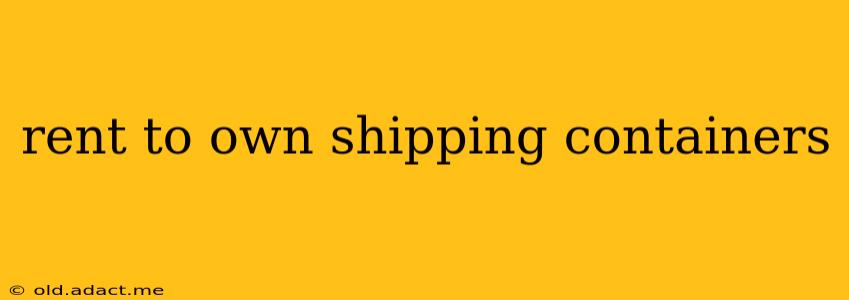The allure of owning your own space, whether for storage, a business, or even a home, is strong. But traditional property markets can be daunting. Enter rent-to-own shipping containers: an increasingly popular alternative offering a unique path to ownership. This guide will explore the ins and outs of rent-to-own shipping container programs, addressing common questions and helping you decide if this option is right for you.
What is Rent-to-Own for Shipping Containers?
Rent-to-own (RTO) shipping containers operate similarly to other rent-to-own agreements. You pay a monthly rental fee for a shipping container, with a portion of each payment going towards the eventual purchase price. After a predetermined period (typically a few years), you own the container outright. The exact terms, including the length of the rental agreement, monthly payments, and final purchase price, vary widely depending on the provider, the container's condition, and the location.
What are the Advantages of Rent-to-Own Shipping Containers?
- Affordability: RTO programs often make owning a shipping container more accessible than a lump-sum purchase, breaking down the cost into manageable monthly installments.
- Flexibility: You can use the container immediately while making payments, unlike traditional financing options that might require a significant down payment upfront.
- Customization: Once you own the container, you have complete freedom to customize it to your specific needs, from modifying it for storage to transforming it into a unique living space or business.
- Portability: Shipping containers are inherently movable. Should your needs change, you can potentially relocate the container.
How Do Rent-to-Own Shipping Container Programs Work?
The specifics vary by provider, but generally, you'll need to:
- Find a reputable supplier: Research different companies, compare their terms and conditions, and read reviews before committing.
- Select a container: Choose a container that meets your size and condition requirements. Factors such as age, condition, and modifications affect price and rental terms.
- Sign a contract: Carefully review the contract, paying close attention to the payment schedule, ownership terms, and any associated fees or penalties.
- Make monthly payments: Consistent and timely payments are crucial for maintaining the agreement.
- Take ownership: Once the agreed-upon payment period is complete, the container becomes your property.
What are the Disadvantages of Rent-to-Own Shipping Containers?
- Higher overall cost: The total cost over the rental period is likely higher than buying outright. This is because of the interest built into the monthly payments.
- Potential for penalties: Late or missed payments can result in significant penalties, potentially jeopardizing your ownership.
- Limited selection: Rent-to-own options may offer fewer choices in terms of container size, condition, and modifications compared to buying directly.
- Contract terms: Thoroughly understand the terms and conditions of your contract before signing. Hidden fees or unfavorable stipulations can significantly impact your overall cost.
How Much Does Rent-to-Own a Shipping Container Cost?
The cost varies considerably, depending on factors such as:
- Container size: Larger containers naturally cost more.
- Container condition: New or "one-trip" containers are more expensive than used ones.
- Location: Rental prices can vary significantly based on geographic location and demand.
- Length of the agreement: Longer rental agreements may result in lower monthly payments but higher overall costs.
It's crucial to obtain multiple quotes from different providers before making a decision.
Are there hidden fees with rent-to-own shipping containers?
Yes, there can be. Always carefully read the contract to identify any hidden fees or charges. These could include:
- Delivery and setup fees: Costs associated with transporting and positioning the container on your property.
- Maintenance fees: Some providers might charge for maintenance or repairs.
- Early termination fees: Penalties for breaking the contract before the agreed-upon term.
Where can I find rent-to-own shipping containers?
Several companies specialize in renting or selling shipping containers. Online searches for "rent-to-own shipping containers [your location]" will yield various results. Always thoroughly vet potential suppliers, checking reviews and references before committing to a contract.
Conclusion:
Rent-to-own shipping containers can be a viable option for those seeking affordable access to this versatile storage or building solution. However, careful consideration of the advantages, disadvantages, and contract terms is crucial to making an informed decision. Thorough research and comparison shopping are essential to finding the best deal and ensuring a smooth ownership transition.
